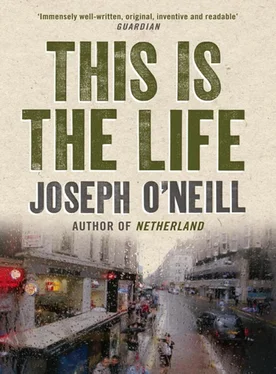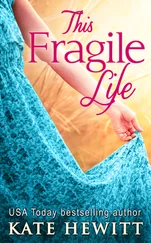‘Cheer up,’ I said, and touched her shoulder. She was sad, and when we turned into the tube station she wordlessly boarded her packed train. I kept my eye on her in the carriage as the windows clouded up. She forced herself between pinstriped commuters, gripping a stainless steel bar an inch from her face. The train rolled off. She was on her way, heading for her office in Hounslow. She worked in the office equipment business. Her job was to follow up on the photocopiers and computer terminals and telephone systems that her company had sold, and to make sure that everything was to the clients’ satisfaction. It did not sound like a very fulfilling job to me, especially for an intelligent person like Susan. How perceptive of her, for example, to note that she lived in the future! She was right, as well. She was continually preoccupied with upcoming events — ‘It’s my birthday four weeks on Tuesday,’ she would announce. ‘The bank holiday is sixteen days away. What are we going to do?’ Or she would ask: ‘This time next year: I wonder what I’ll be doing this time next year? Or this time ten years from now?’ Poor Susan, I thought, as I stepped on to my train. Poor thing, I thought. I found a seat, opened the newspaper and read about Donovan’s collapse in court.
I would like, then, to put all thought of Donovan out of my mind, but I cannot, not even on a balmy morning like this one, full of easy distractions. So perhaps the best thing would be to take a robust, broad-brush approach to it all, so that I can be done with it, quickly and once and for all? Surely all I need do is state the main facts and draw the necessary conclusions? There is, after all, a limit to how many conclusions one can sensibly draw from events of this sort. And I know that I am no great analyst of human affairs, but is it really necessary, even for me, to go through all the facts at such length?
It is, of course. The truth is, I am miserably incapable of quickly picking out what matters, what is salient and what is not.
Enough asides and irrelevances; seated at my garden table in my dressing-gown, I return to the morning of another Sunday, the morning after my trespass in Donovan’s house. I awoke like an adulterer, racked with guilt, and stepped straight into a powerful shower to cleanse myself. I dressed quickly and caught the tube to Notting Hill. By lunchtime I was back home with my newspaper and a creamy coffee, and everything was back in its place. Enough of Donovan, I thought. No more escapades.
On Monday morning, too, all I wanted was peace and quiet, a return to normality. The last thing I wanted was anything to do with Donovan.
‘James, I have a Mr Donovan for you,’ said June.
A surge of nausea passed through me. He knew. Donovan knew that I had been snooping around his house. Somehow he had found out.
‘I’m not in,’ I said. ‘Tell him I’m out. Tell him I’m in a meeting.’ I had to stall. One of the pieces of equipment the man carried around in his head was a polygraph — in cross-examination he registered lies and evasions instinctively, uncannily — and with my hopelessness at deceit, he would sniff the truth and the whole truth out of me in two seconds flat. It was imperative that I did not speak to him.
I listened to June decisively stalling Donovan. She has a natural talent for that type of task — speedy, unhesitating deception.
‘What did he want?’ I asked.
‘He wants to have lunch with you. He left a number for you to ring at the Savoy.’
The Savoy?
‘June, did Mr Donovan have an Irish accent?’
‘More American, I thought. But yes, he did have a bit of a brogue too, come to think of it.’
I exhaled with relief: that was not Donovan, that was Donovan’s father. Next question: what did he want?
‘I want to talk to you about my son’s divorce,’ said Mr Donovan when he called back. ‘There are one or two things I feel we ought to discuss.’
‘Mr Donovan, you’re aware that my relationship with Mr Donovan — your son, that is — is confidential. I’m not allowed to discuss what we have discussed together, if you understand me.’
‘I know that. But let’s put it this way: I’ve certain things to tell you, and all I’m asking is that you listen. Now, that’s not unethical, is it? I won’t be asking you to disclose anything you feel is between yourself and Michael.’ I hesitated. ‘Mr Jones,’ said Mr Donovan, ‘I would be very appreciative if you could come, because I know your time is scarce. But I really do think it would be in everybody’s interest if we met. Do you have any problem with eating here? At my expense, of course.’
The Savoy is only a step or two down the Strand from where I work, so there was no difficulty in meeting Mr Donovan as arranged, at one o’clock. I walked in and looked around. He had told me to look out for an old man in a wine-coloured polo-neck shirt and a grey tweed jacket. That was what he looked like, he said.
I saw someone who matched the description reading a newspaper in an armchair. What made me sure it was Mr Donovan were the hands that gripped the pages: they were like the hands of his son.
He rose with a beam across his face. Fergus Donovan was about sixty-five years old, I guessed. He looked very fit and trim, and his skin was like a yachtsman’s, darkened and flecked by the elements. His hair was white and distinguished, and his eyes were pale green, paler than his son’s. He led me briskly to our table and immediately began cross-examining the waiter about various items; finally he ordered a pamplemousse followed by a baked potato and a salad of raw cauliflower, Californian lettuce and cucumbers, a meal not offered by the menu. He ordered further that olive oil and lemon juice be brought to the table with the salad so that he could concoct his own dressing. He drank Irish mineral water.
When the waiter had gone, Mr Donovan leaned towards me with twinkling eyes, as though he were about to tell a joke. ‘Jim, I want to ask you a question. You don’t mind, do you?’
I shook my head. June was right, there was a slight transatlantic inflexion to his speech. ‘No, please do, Mr Donovan,’ I said.
‘Fergus — call me Fergus. Jim, how well do you know Michael?’
Not very well, I explained, and briefly went through the history of my relations with his son.
‘And what do you make of him?’
‘Well, he’s a fine lawyer, of course,’ I said. The question made me uncomfortable. ‘He’s a very gifted man.’
‘What else?’ Mr Donovan still wore his friendly, expectant smile. It was a grin, in fact.
‘What else? Well — I mean, he’s … he’s a remarkable person,’ I said. I could think of nothing else to say without becoming too personal.
‘He’s remarkable all right,’ Mr Donovan said vehemently. ‘He’s a remarkable dope, that’s what he is.’
Mr Donovan had a resonant voice, and his remark caused one or two heads to turn in our direction. Without changing the expression on my face I reprimanded myself. Stupid. I was stupid to accept this invitation. Look where it had got me, lunching with a crackpot.
‘Yes, well …’ I said.
‘You think I’m just a crazy old man. I know you do, I can tell by looking at your face.’ I began to make a gesture of denial but Mr Donovan waved me down. ‘But I’ve known Mikey longer than you have, and take it from me, he’s a dope. When it comes to law, maybe not. But when it comes to life, he’s got nothing but rocks in his head.’ He unfolded his napkin carefully and placed it on his lap. Then he vigorously broke up his bun, milking remarkably few crumbs, and buttered a piece. Chewing it, he said, ‘Now I don’t know much about anything.’ He spoke with his mouth full, but in a strangely wholesome and appetizing way. I crumbled my bread and took up my napkin. ‘I’m just a druggist. A quack. I’m full of bullshit, I know that. But that doesn’t disqualify me from seeing what’s in front of my nose. And you know what I see? Trouble. Trouble with a capital T.’
Читать дальше
Конец ознакомительного отрывка
Купить книгу












